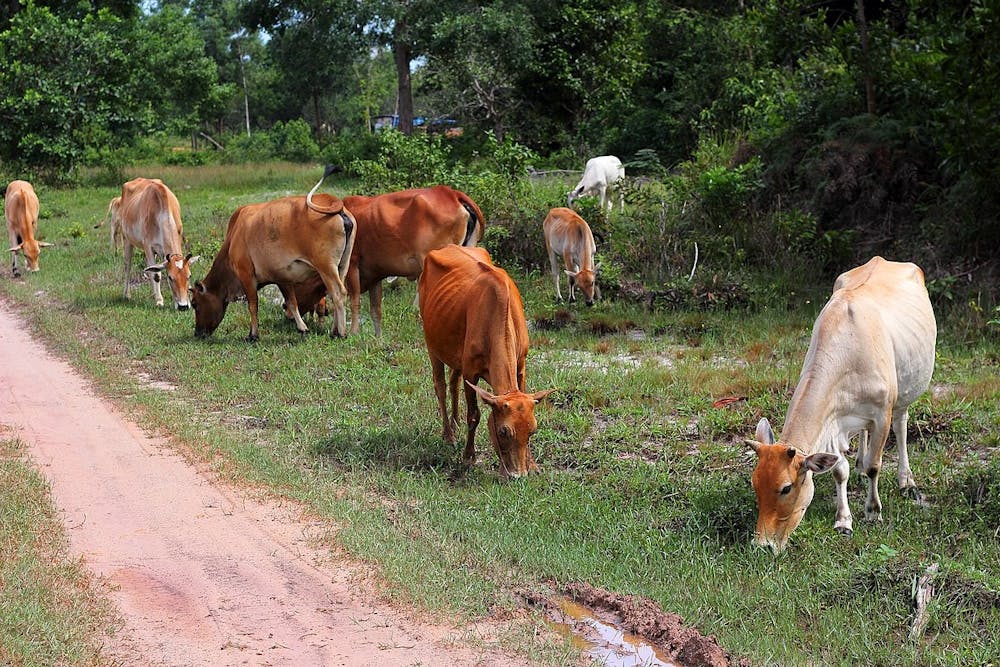As the new semester begins, many students return to grounds with the hope of a new start — a new year, new classes and the chance for growth and change that goes with them. However, this year, consider using this opportunity to eat less meat. There are many reasons to eat fewer meat and dairy products, but the staggering impact of the livestock industry — both on our climate and in animal welfare —are compelling places to start.
As a vegetarian who hopes to eventually become vegan, my primary interest in cutting animal products out of my diet is ethical. The treatment of animals in factory farms is unambiguously cruel, and the greenhouse gasses emitted by livestock has a tremendous effect in climate change. However, as much as I wish I could magically create a world in which everyone is vegetarian or vegan, the most effective way to reduce the harm done to our environment and animals is to encourage others to make small, less intimidating changes to their habits. Something as simple as eating fewer meat-based meals per week can help have a tangible impact on greenhouse gas emissions, and lessen the need to increase the number of animals kept in appalling conditions.
According to the UN Intergovernmental Panel on Climate Change, greenhouse gas emissions related to livestock production roughly match those from transportation, both at around 14 percent. That’s right — meat and dairy have the same effect on global climate change as all the world’s trains, cars and airplanes. Human caused climate change is happening — and affecting our world at an alarming rate. When faced with the prospect of a future ravaged by rising sea levels, more frequent hurricanes and wildfires, causing thousands of climate refugees, it is easy to feel helpless. Seventy-one percent of global emissions are caused by just 100 companies — companies the average person is powerless to effect, and often tied by economic necessity to consume their products. However, animal products are not necessary for human survival. For those living in industrialized, wealthy nations — and particularly those with easy access to groceries stores selling a variety of plant-based protein options — a diet reducing animal products is a clear way to personally reduce greenhouse gas emissions.
Further, animals living in these industrialized meat and dairy operations are often treated incredibly cruelly. For example, despite having cognitive abilities similar to chimpanzees, nursing pigs are trapped in crates so small they cannot turn around. Dairy cows are artificially inseminated and forced to over-produce milk, while their calves are taken and kept in suffocatingly small pens—not to mention the inherent ethical issues in slaughtering animals by the millions. If you’re struggling to care about these examples of animal cruelty, think about these things happening to your family dog or cat—pigs have similar intellects. Further, the effects of this treatment of animals has real human consequences. In recent years, outbreaks of E. coli and salmonella have been linked to factory farms. Further, jobs in livestock and meat-packing are brutal, messy work—work most often done by undocumented workers who are vulnerable to unethical labor practices and dramatic underpayment. Thus, not only does a decrease in animal product consumption improve our environment, but it also works to prevent both the animals themselves and those working in the livestock industry from being treated in unconscionable ways.
Reducing animal products in our diets is an easy, accessible way to improve how our actions and material consumptions affect both the environment, and the animals who live in it. The decision to reduce animal products is easy for many. Humans can live perfectly healthy lives without animal products, and for those in places where meat consumption is necessary due to difficulty in finding healthy protein options or certain cultural practices, simply reducing, not eliminating meat can still have real impact. Fewer customers buying meat means lower demand, which means decreased production — fewer animals bought, sold and slaughtered, with less greenhouse gasses produced along the way. Thus, this new year, when seeking a lifestyle change which will result in a better, more ethically sound existence, give meatless Mondays a try.
Emma Camp is an Opinion Columnist for The Cavalier Daily. She can be reached at opinion@cavalierdaily.com.
The opinions expressed in this column are not necessarily those of The Cavalier Daily. Columns represent the views of the authors alone.







